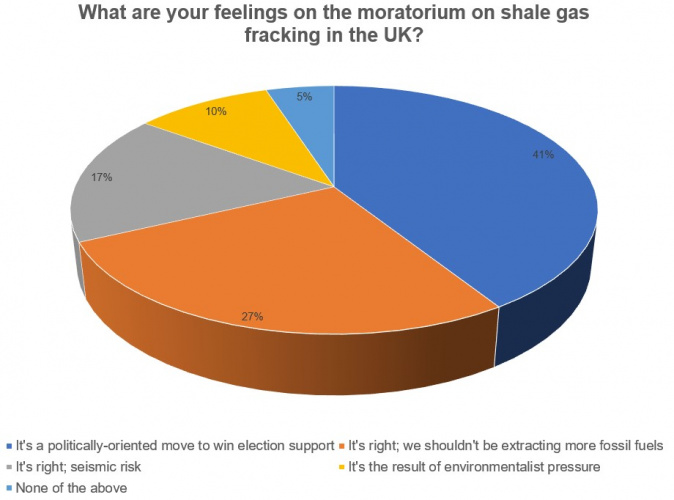Last week’s poll: fracking moratorium
A fresh moratorium on fracking for shale gas has been enforced by the government, and a sizeable number of voters in last week’s poll believe the move has been politically motivated.


The government based its latest suspension of fracking activities on a report by the Oil and Gas Authority (OGA), which found that it is not currently possible to accurately predict the probability or magnitude of earthquakes linked to fracking activities.
But with a general election due in December, 41 per cent of respondents to last week’s poll viewed the move as being politically oriented to win votes.
__________________________________________________________________
__________________________________________________________________
Just over a quarter of respondents (27 per cent) agree that the UK shouldn’t be extracting fossil fuels and favour the move, followed by 17 per cent who see fracking as a seismic risk.
Of the remaining 15 per cent of the vote, 10 per cent viewed the moratorium as being brought about by environmental pressure, and five per cent opted for ‘none of the above’.
A refrain of ‘keep it in the ground’ currently echoes around the comments section, which remains open to your comments on this subject. We do, however, ask that your comments remain on topic and that responses are concise and comply with our guidelines for the content of comments.
Register now to continue reading
Thanks for visiting The Engineer. You’ve now reached your monthly limit of news stories. Register for free to unlock unlimited access to all of our news coverage, as well as premium content including opinion, in-depth features and special reports.
Benefits of registering
-
In-depth insights and coverage of key emerging trends
-
Unrestricted access to special reports throughout the year
-
Daily technology news delivered straight to your inbox










Water Sector Talent Exodus Could Cripple The Sector
Maybe if things are essential for the running of a country and we want to pay a fair price we should be running these utilities on a not for profit...